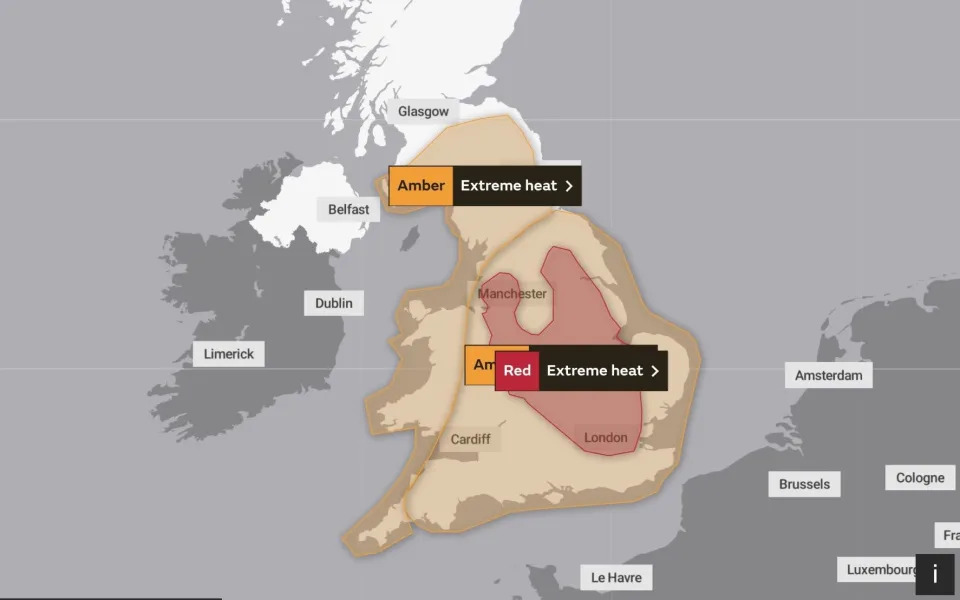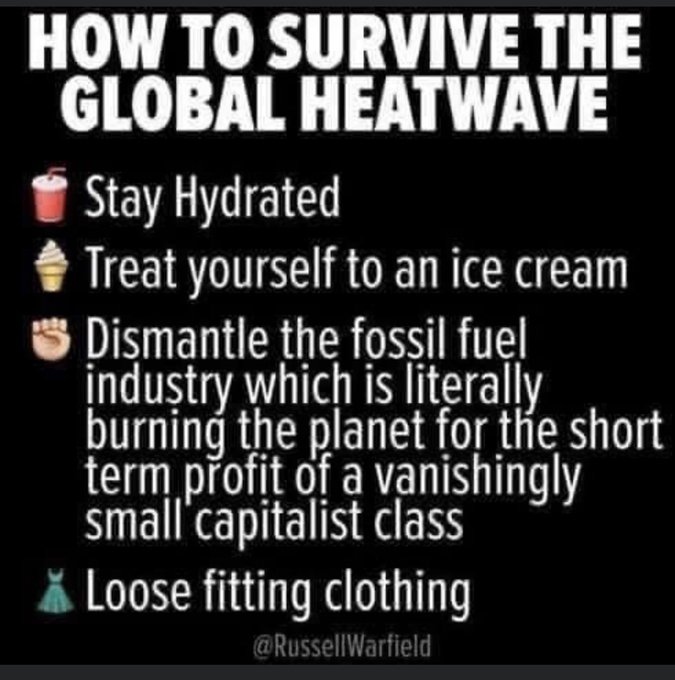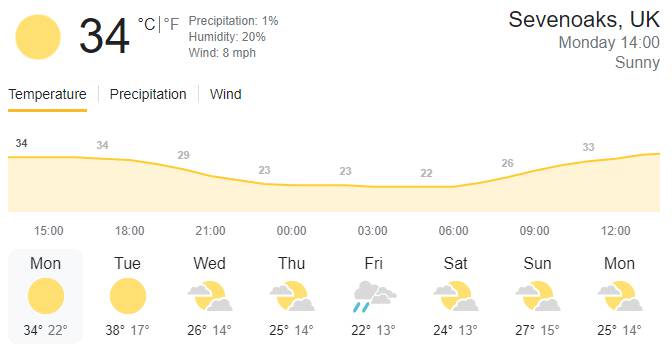Met office issues first ever RED extreme heat warning
Jul 15, 2022 20:54:15 GMT
John and MikeMusic like this
Post by Slinger on Jul 15, 2022 20:54:15 GMT
UK heatwave: Met Office issues first
ever RED extreme heat warning
The public has been warned that it will not be safe next week to go outside and “play in the sun”, as the Met Office issued an unprecedented warning about the imminent heatwave.
A “red warning” has been declared across England as the forecaster said national temperature records would likely be broken on Monday or Tuesday next week.
While such warnings have previously been issued for storms, one has never been declared overheat.
There is a 50 per cent chance that temperatures of more than 40C will be seen, forecasters said, the first time this has been predicted for the UK.
The heat is expected to put more pressure on already overstretched emergency services, disrupt daily routines and lead to travel delays as experts warned of “unprecedented” weather conditions.
The UK’s first-ever national heat health emergency is set to bring “potential effects on transport systems, food, water, energy supplies and businesses”, the UK Health Security Agency said.
Temperatures of 41C were forecast at Heathrow Airport, more than two degrees higher than the current record of 38.7C set in 2019 in Cambridge.
Two days of very hot weather with a “tropical night” in between, where temperatures do not fall below 20C, are expected to lead to widespread health problems, including heat exhaustion and heatstroke, particularly among the elderly. Hospitals cancelled routine operations and appointments in preparation.

UK heatwave: Met Office issues first ever red heat warning - Met Office
In an apocalyptic video posted online, Professor Penny Endersby, chief executive at the Met Office, warned that the UK was not prepared.
She said: “We’ve seen when climate change has driven such unprecedented severe weather events all around the world it can be difficult for people to make the best decisions in these situations because nothing in their life experience has led them to know what to expect.
“Here in the UK, we're used to treating a hot spell as a chance to go and play in the sun. This is not that sort of weather. Our lifestyles and our infrastructure are not adapted to what is coming.”
‘National emergency’ health warning
The UK Health Security Agency has increased its heat health warning from level three to level four - a “national emergency”.
Level four is reached “when a heatwave is so severe and/or prolonged that its effects extend outside the health and social care system ... At this level, illness and death may occur among the fit and healthy, and not just in high-risk groups”, it said.
Downing Street has not issued work-from-home guidance during the heatwave.
A No 10 spokesman said: “Different sectors and different professions may have different staffing requirements, it wouldn’t be for me to set out a broad policy for everybody, that would be a matter for individuals and their employers.”
Britain will suffer “delays on roads and road closures, along with delays and cancellations to rail and air travel, with significant welfare issues for those who experience even moderate delays”.
England’s chief medical officer, Professor Sir Chris Whitty, asked people on Twitter to look out for each other.
Motorists have been told to try and make their journeys outside of the hottest times of the day, particularly if they have older cars.
Gritters out with sand to stop ‘roads melting’
Sean Sidley, of the AA, said: “There are reports of road gritters being out (with sand) this weekend to reduce the chances of our roads melting.
“If it does get sticky on the roads, there's nothing worse than being stuck in a jam with the mercury rising, so make sure you carry plenty of water - at least a litre per person - and sufficient fuel, or if you’re driving an electric vehicle (EV) make sure you have plenty of charge so you can use the air conditioning when needed.”
Rod Dennis, RAC Breakdown spokesperson, said: “We anticipate there could be around 15 to 20 per cent more breakdowns on Monday and Tuesday, which equates to more than 1,000 extra people needing help each day.”
A No 10 spokesman said railway speed restrictions may be needed on “some parts of the network next week to manage the hot weather and to avoid any potential damage”.
Jake Kelly, of Network Rail, warned that journeys will take “significantly longer and delays are likely as speed restrictions are introduced to keep passengers and railway staff safe”, urging people to travel only if absolutely necessary on Monday and Tuesday.
The organisation said response teams will be deployed to mitigate the impact of the extreme heat where possible, but passengers are likely to experience disruption if current forecasts are realised.
SOURCE & MORE
And to finish cheering you up, "extreme heat can lead to tyres becoming over-inflated, causing blowouts which lead to car crashes!, paramedics have warned.
ever RED extreme heat warning
The public has been warned that it will not be safe next week to go outside and “play in the sun”, as the Met Office issued an unprecedented warning about the imminent heatwave.
A “red warning” has been declared across England as the forecaster said national temperature records would likely be broken on Monday or Tuesday next week.
While such warnings have previously been issued for storms, one has never been declared overheat.
There is a 50 per cent chance that temperatures of more than 40C will be seen, forecasters said, the first time this has been predicted for the UK.
The heat is expected to put more pressure on already overstretched emergency services, disrupt daily routines and lead to travel delays as experts warned of “unprecedented” weather conditions.
The UK’s first-ever national heat health emergency is set to bring “potential effects on transport systems, food, water, energy supplies and businesses”, the UK Health Security Agency said.
Temperatures of 41C were forecast at Heathrow Airport, more than two degrees higher than the current record of 38.7C set in 2019 in Cambridge.
Two days of very hot weather with a “tropical night” in between, where temperatures do not fall below 20C, are expected to lead to widespread health problems, including heat exhaustion and heatstroke, particularly among the elderly. Hospitals cancelled routine operations and appointments in preparation.

UK heatwave: Met Office issues first ever red heat warning - Met Office
In an apocalyptic video posted online, Professor Penny Endersby, chief executive at the Met Office, warned that the UK was not prepared.
She said: “We’ve seen when climate change has driven such unprecedented severe weather events all around the world it can be difficult for people to make the best decisions in these situations because nothing in their life experience has led them to know what to expect.
“Here in the UK, we're used to treating a hot spell as a chance to go and play in the sun. This is not that sort of weather. Our lifestyles and our infrastructure are not adapted to what is coming.”
‘National emergency’ health warning
The UK Health Security Agency has increased its heat health warning from level three to level four - a “national emergency”.
Level four is reached “when a heatwave is so severe and/or prolonged that its effects extend outside the health and social care system ... At this level, illness and death may occur among the fit and healthy, and not just in high-risk groups”, it said.
Downing Street has not issued work-from-home guidance during the heatwave.
A No 10 spokesman said: “Different sectors and different professions may have different staffing requirements, it wouldn’t be for me to set out a broad policy for everybody, that would be a matter for individuals and their employers.”
Britain will suffer “delays on roads and road closures, along with delays and cancellations to rail and air travel, with significant welfare issues for those who experience even moderate delays”.
England’s chief medical officer, Professor Sir Chris Whitty, asked people on Twitter to look out for each other.
Motorists have been told to try and make their journeys outside of the hottest times of the day, particularly if they have older cars.
Gritters out with sand to stop ‘roads melting’
Sean Sidley, of the AA, said: “There are reports of road gritters being out (with sand) this weekend to reduce the chances of our roads melting.
“If it does get sticky on the roads, there's nothing worse than being stuck in a jam with the mercury rising, so make sure you carry plenty of water - at least a litre per person - and sufficient fuel, or if you’re driving an electric vehicle (EV) make sure you have plenty of charge so you can use the air conditioning when needed.”
Rod Dennis, RAC Breakdown spokesperson, said: “We anticipate there could be around 15 to 20 per cent more breakdowns on Monday and Tuesday, which equates to more than 1,000 extra people needing help each day.”
A No 10 spokesman said railway speed restrictions may be needed on “some parts of the network next week to manage the hot weather and to avoid any potential damage”.
Jake Kelly, of Network Rail, warned that journeys will take “significantly longer and delays are likely as speed restrictions are introduced to keep passengers and railway staff safe”, urging people to travel only if absolutely necessary on Monday and Tuesday.
The organisation said response teams will be deployed to mitigate the impact of the extreme heat where possible, but passengers are likely to experience disruption if current forecasts are realised.
SOURCE & MORE
And to finish cheering you up, "extreme heat can lead to tyres becoming over-inflated, causing blowouts which lead to car crashes!, paramedics have warned.






